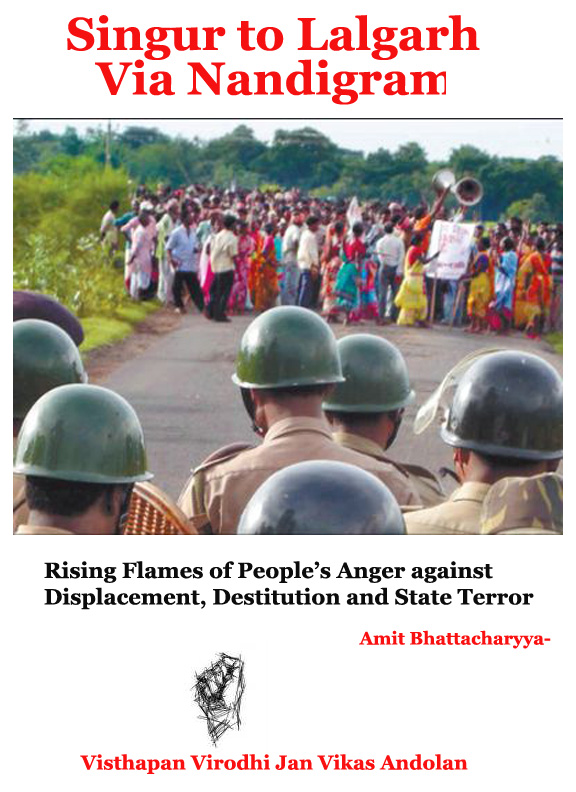Encounters Are Murders’
Posted by Admin on September 14, 2009
 by Bernard D’Mello, MR
by Bernard D’Mello, MR
Inquiries by magistrates into “police encounter” killings in India have mostly corroborated the police version of the situation and reality leading to the deaths. But the Ahmedabad metropolitan magistrate S P Tamang’s investigation of the facts and circumstances leading to the deaths of 19-year olds Ishrat Jahan and Javed Sheikh and two others (25-year old Amjad Ali, alias Salim, and 17-year old Jisan Johar, alias Abdul Gani, claimed by the police to be Pakistani citizens, but their identity is yet to be established) in June 2004 are totally at odds with the Ahmedabad police and the Bharatiya Janata Party (BJP)-led Gujarat government’s claims. The police officers involved, going by the magistrate’s report, had concocted the story that the four were “operatives” of the Pakistan-based Lashkar-e-Toiba (LeT) on a mission to assassinate the chief minister, Narendra Modi, but were apprehended by the crime branch police, and shot dead in a “real” encounter on the outskirts of the city in the wee hours of the morning on 15 June 2004.
Based mainly on evidence from the forensic and post-mortem reports, Tamang has dismissed the police claim and established that the deaths were “cold-blooded murders” in police custody carried out by a set of crime branch police personnel, headed by the then additional commissioner of police, D G Vanzara, during the day before. The crime branch policemen then brought the bodies near the Kotarpur Water Works on the outskirts of the city in the late night/early morning when there were no witnesses around, planted weapons (AK-56) and ammunition, and thus tried to establish the cause of the deaths. Incidentally, Vanzara, a favourite of chief minister Modi, is presently in jail as the main accused in another murder (a staged encounter on 26 November 2005), that of Sohrabuddin Sheikh, and later on, killing his wife Kausarbi and burning her body to remove all traces of that crime.
“Police encounter” as a term seems to have originated in the Indian subcontinent, used by the Indian police, paramilitary, military and other security forces to explain the death of an individual whom they have killed, deemed by them to be a dreaded criminal, gangster/outlaw, terrorist, and/or Maoist/Naxalite. It is a planned extra-judicial killing not authorised by the law or by a court of law, in most cases, staged by planting weapons alongside the dead body to indicate the reason why the person was killed. A first information report is lodged against the dead person reiterating the police version of events. So it was in the case of Ishrat Jahan, Javed Sheikh and the two others.
Ishrat Jahan was a second-year BSc student of Mumbai’s Guru Nanak Khalsa College, and a resident of Mumbra, a distant Mumbai suburb, whose family was in dire straits after her father passed away two years before her own death. She supported the family (she had three sisters and two brothers), now headed by her mother, Shamima, giving tuitions to a batch of 20 school kids at her home. And, to make ends meet, she had additionally taken on the job of a “sales girl” in Javed Sheikh’s business. A spirited young woman, she was determined to see her two younger sisters and two younger brothers through school and college. But then, quite inexplicably, according to Tamang’s report, on 12 June 2004 she and Javed, her employer, were picked up by the Ahmedabad crime branch cops, illegally detained, taken to Ahmedabad and cold-bloodedly shot dead at close range in police custody (Ishrat between 23:00 and 24:00 hrs, and Javed between 20:30 and 21:00 hrs, on 14 June 2004).
The judiciary in the state of Gujarat has been totally paralysed in the aftermath of the 2002 pogroms against Muslims, but it now seems to be recovering. In this, the Supreme Court has been supportive, but not the Congress-led government at the Centre, which has been largely unconcerned about the plight of the victims of the pogrom. A union home ministry affidavit filed in the Gujarat High Court — in relation to a writ petition brought by Israt Jahan’s mother, Shamina, pleading for a Central Bureau of Investigation (CBI) probe into the facts and circumstances leading to the killings — agrees with the Gujarat government that the four persons were members of the LeT and sides with it in its stand that no CBI inquiry is warranted in the case. There is no doubt that both the BJP and the Congress continuously vie with each other to prove who is more patriotic; and here, patriotism means who is more anti-Pakistan. Indeed, although the lone terrorist captured in the 26/11 2008 Mumbai attacks, Ajmal Amir Kasab, has admitted his guilt, the powers-that-be have decided to go on with the trial, using it as an anti-Pakistan political platform. We do not know in what context Samuel Johnson said that “patriotism is the last refuge of a scoundrel”, but my first editor, the late Samar Sen, who edited the Kolkata weekly, Frontier, used to say that a particular assortment of rogues resort to it at the first instance. In the branding of Ishrat Jahan and the three others as “terrorists”, what is roguishly being implied is that in the case of terrorists linked to Pakistan it is permissible, indeed necessary, to sidestep the required judicial processes of investigation and trial and punish them by death right away.
To be fair to the BJP-led government in Gujarat, encounters are an all-India phenomenon. Indeed, they happen even in the nation’s capital

























Leave a comment